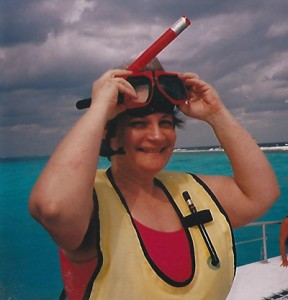The process of upgrading and repairing Byron Barlowe’s home helped him to see how God does the same kind of transformation in the souls of Christ-followers.
My wife and I are living in a suspended state of misery in our own home. It’s like camping in a plastic-lined dustbin after a tornado blew furniture and books into random piles. Hidden in every crevice there’s a thin fog of whitish dust and snow that won’t melt. “How long, O Lord?” This odyssey started as we launched a long-awaited kitchen remodel, which would be stress enough: “Where’s that sink they took out with the bulk waste—we need it back until the granite people come to install the new one!” Camping indoors again.
But then we succumbed to the contractor’s compelling sell-job on removing popcorn from our ceilings—you know, that lumpy stuff hanging from 20th century ceilings. “They’ll get it done and clean it up for you.” No sweat, right? Right!
Anyone who’s lived through a major renovation or addition can testify to the disturbance. It’s an all-encompassing project. “How many more trips to Home Depot?” I’m at the library writing this and will head to the shower at the YMCA. The paint makes it hard to sleep. Finally, we left for vacation. Disruption of routines and an exploded sense of place overwhelms and badgers us.
Yet God is in it. The ordeal is bringing out loads of attitudes and frustrations in me, especially since God seems to be doing an attitude renovation within me simultaneously. Is that dual lesson cruel of God, or spiritually strategic? Do I really grow when things sail smoothly along?
Yes, the promise of a new look and feel gets lost in the temporary tiresomeness of it all. The more you have, the more you pay in so many ways! Yet, what we had was not up to grade. Some of it was poised to cause disaster, like some plumbing in our kitchen. Replacing the working fridge with a cooler one (accidental pun) revealed a faulty valve. It had to be replaced. In the same way, my soul needs a makeover.
Like a master plumber, the Lord needs to hook up the new pipes of grace he has for me. He’s renovating my heart. I need to grow into the new creation I already am. New openings for new blessings, old things made new. Getting hung up on my way of seeing issues or settling for an inadequate view of God’s goodness calls for a major overhaul. The Lord is committed to make this happen as I somewhat grudgingly lay my life before him in submission—again. It hurts and is a mess, like the unexpected plumbing issue. But like the fridge fix, it makes possible a bounty of unspoiled fruit and prevents a nasty flood!
Back to the originally intended project: the process for the ceiling redux is a multi-step process. It requires the following:
• scraping: complete with the roar of compressor to spray water, a sharp scraper, and the old junk that falls to floor (and into everything) like oatmeal or, well, wet popcorn
• “mud” to fill holes and fix gouges, a lot like grout for tile or what painters do with picture hanger holes
• texture for a new, updated look, smoother than the stuff from the days of puffy hairdos and disco music!
• And paint to “top” it off and complete the enjoyable and more livable change.
Simple processes aside, the disarray and disruption of either kind of renovation cannot be overstated. Every last physical item, habit, and way of life has been overturned, from sleeping to showering, eating to breathing itself. Repeat after me, self: temporary pain for years of gain. And isn’t that what spiritual growth is like? Is it worth it? This is the operative question each time the Lord convicts us of sin or a character issue. Sanctification—the project of turning us into the real likeness of Christ—promises eternal reward and glory! It showcases the goodness and truth of God. Maturity matters, even though its development stinks at efficiency and convenience from a human perspective.
Because negative thought patterns burn into our minds and even have bodily effects, they need to be peeled off, removed. Kind of like the dragon skin of the character Eustace, the unbearably cynical and snooty boy character in C.S. Lewis’s Voyage of the Dawn Treader. His spiritual blindness and insensitivity had to go but was painful to remove. Sin sticks and separates us from God, goodness and others. Due to its toxic spiritual effects, transformation can’t be kept waiting. We, like young Eustace, need to release our sense of entitlement and thanklessness, rid ourselves of a false sense of pleasure and pride. He have to grow new skin. We too must be scraped over, repaired, remade and painted afresh.
What does this spiritual scraping of sanctification look like in more detail? Well, not unlike ceiling refurbishment in so many ways.
Necessary Disruption
First, like those old popcorn ceilings, coverings in my soul simply must be replaced, and not for reasons of fashion. Scraping ceilings and hearts is inconvenient—the workers are in our house all day. The Lord does his work while we do our lives. There is never a “good time” for it. You just have to suck it up and have your life turned around a bit. I have been forced, in no small part by dealing with contractors and suppliers, to wrestle down thoughts like, “People are clueless—I wish they’d smarten up and pay attention.” While there is truth behind those convictions as we all know, people have reasons for distraction and the unredeemed have no choice but to be self-centered and confused. The Lord has been revealing what it means to “value others above yourselves” (Philippians 2:3). When my protective and cynical dragon skin layers are removed, I begin to appreciate how gentle and ordered others’ minds can be. Their skills and especially their ability to roll with messy, changeable situations amazes me. They are better than me at a lot of things. Regardless of my perceptions, God sees them as priceless and since he loves me supremely, so I can afford to regard them as more important than myself.
Healing Takes Time, Repetition
Second, filling in the holes and cracks means going over the same “ground” again. It’s detailed work and has to set up and dry before you can move on. This does not feel efficient, yet it ensures that things are permanently restored. Often, the soulish equivalent of this comes in the form of deep fellowship and counseling—filling in the injury done to our souls with solid truth and love. The old becomes new again, the cracked smooth, the damaged healed. “Restore to me the joy of your salvation and grant me a willing spirit, to sustain me” (Psalm 51:12).
The Grace of Preparation and Protection
In fact, prepping the house took the most time: taping plastic to the floor, draping furniture and ceiling fans, disconnecting light fixtures and removing air vents. It’s as if the protection of our belongings and dwelling takes precedence over the new look and underlying stuff. Isn’t this God’s way? As his Spirit renovates our lives, he lines us with protective layers of grace and love, draping us with the encouragement of prayers he evokes on our behalf and the love of fellow Christ-followers.
Renovation Takes Force
Third, just like ceiling overhauls, retexturing is yet another wearying pass over the same square footage for the purpose of renewal—and it has to be forced. Workers hold a little orange plastic tank attached to a hose that’s hooked up to a compressor, then spray the new coating on the freshly prepared surface. The pneumatic motor kicks into a whining screech that fills the house. Without that push, the spray can’t come out of the nozzle ten feet in the air. Similarly, the Spirit’s regeneration of our souls is noisy, messy, pushy and downright unpleasant. We may tire of reaching up to do our part in spreading newness onto the same surface from which God has removed the old stuff. Our shoulders and hearts get exhausted, sore from holding up our part of the work. The air is a bit nasty to breathe. But if our new life is to be realized, it has to be done, forcibly.
The Stuff of Spiritual Renovation
Just what is such spiritual newness? The material used is God’s Word illumined by his Spirit, creating new pathways for our minds, hearts and wills, right down to the bone and marrow of our beliefs. It means filling our minds with “whatever is true . . . honorable . . . right, . . . pure . . . lovely . . . of good repute . . . any excellence [and] anything worthy of praise” (Philippians 4:8), being “transformed” and “renewed” in our minds (Romans 12:1-2), reckoning (deciding to be so) ourselves dead to sin and alive to God in Christ Jesus” (Romans
6:11). All of these fresh Spirit-pumped coatings can cover our internal overheads with new, living realities. That is, thinking and believing in a life-giving outlook that takes seriously the promise that “if anyone is in Christ, he is a new creation; the old has passed away, and see, the new has come!” (2 Corinthians 5:17) is the ultimate renewal. Now, the house has a new sky, if you will, and the sun is ready to shine a bit brighter. As we capitulate to the often onerous process of scraping, mudding, and texturing, we experience a brand new covering for ceilings and souls-in-Christ. And now for the coup de grace!
New Paint, New Spiritual Robes
Painting is the final stage of this household transformation. Gone are the ugly, useless bits, replaced with the smoothness of shalom—peace-filled blessedness—where defects get filled in and fixed as we submit to the work. Likewise, as we are molded into Christ’s likeness, we put on robes of pure white righteousness (Revelation 19:8; 3:4). So much can be said about the glory of holiness produced in willing saints. Suffice to say that the glory that awaits us outshines even the brightest hues applied to earthly surfaces. Our spiritual man is growing brighter, even as our bodies break down and fade. “We do not lose heart, but though our outer man is decaying, yet our inner man is being renewed day by day” (2 Corinthians 4:16).
Many of us have ceilings that overhang us with old, outdated looks. All believers in Christ have rooms—perhaps whole houses—that need reworking. Let the scraping begin. It’s worth it!
 His lower back, where he’d had back surgery six weeks before, was wet. His t-shirt was wet. The sheet was wet. His fingers glistening with a strange wetness from reaching back to investigate, he asked me to check what was going on. I saw a rivulet of fluid pouring out of the top of his surgical incision. Something was really, really wrong.
His lower back, where he’d had back surgery six weeks before, was wet. His t-shirt was wet. The sheet was wet. His fingers glistening with a strange wetness from reaching back to investigate, he asked me to check what was going on. I saw a rivulet of fluid pouring out of the top of his surgical incision. Something was really, really wrong. For the last nine years I have had the privilege of teaching visual arts in the public school system here in Texas. Each year I start off with one question on the board: “What is art?” Students give a wide range of answers but they usually land somewhere near the phrase “art can be whatever you want it to be.”
For the last nine years I have had the privilege of teaching visual arts in the public school system here in Texas. Each year I start off with one question on the board: “What is art?” Students give a wide range of answers but they usually land somewhere near the phrase “art can be whatever you want it to be.” Once students can articulate what they believe about art and the origins of those beliefs, we take a second look. How do you know your beliefs are true? How has your understanding of art changed after your studies? Students think they are profound when they make grandiose statements like “art is whatever I want it to be.” The goal isn’t to change their beliefs. The goal is to teach them to see clearly.
Once students can articulate what they believe about art and the origins of those beliefs, we take a second look. How do you know your beliefs are true? How has your understanding of art changed after your studies? Students think they are profound when they make grandiose statements like “art is whatever I want it to be.” The goal isn’t to change their beliefs. The goal is to teach them to see clearly. I love to snorkel in the Caribbean. I love being able to look at the beautiful fish and corals of the underwater world while effortlessly breathing the air of the above-water world. I love functioning in two worlds at the same time.
I love to snorkel in the Caribbean. I love being able to look at the beautiful fish and corals of the underwater world while effortlessly breathing the air of the above-water world. I love functioning in two worlds at the same time. The cultural narrative has become, “LGBT represents normal, healthy variations in human sexuality, so everyone should support and celebrate all forms of sexual diversity. And if you don’t, we’re going to punish you, shame you, and squelch your voice.”
The cultural narrative has become, “LGBT represents normal, healthy variations in human sexuality, so everyone should support and celebrate all forms of sexual diversity. And if you don’t, we’re going to punish you, shame you, and squelch your voice.” In the last several months, both of my severely arthritic hips were replaced. In addition to the wonderful blessing that I am out of pain, the surgeries and recoveries were full of lessons pointing me to spiritual truths I am so very thankful for:
In the last several months, both of my severely arthritic hips were replaced. In addition to the wonderful blessing that I am out of pain, the surgeries and recoveries were full of lessons pointing me to spiritual truths I am so very thankful for: